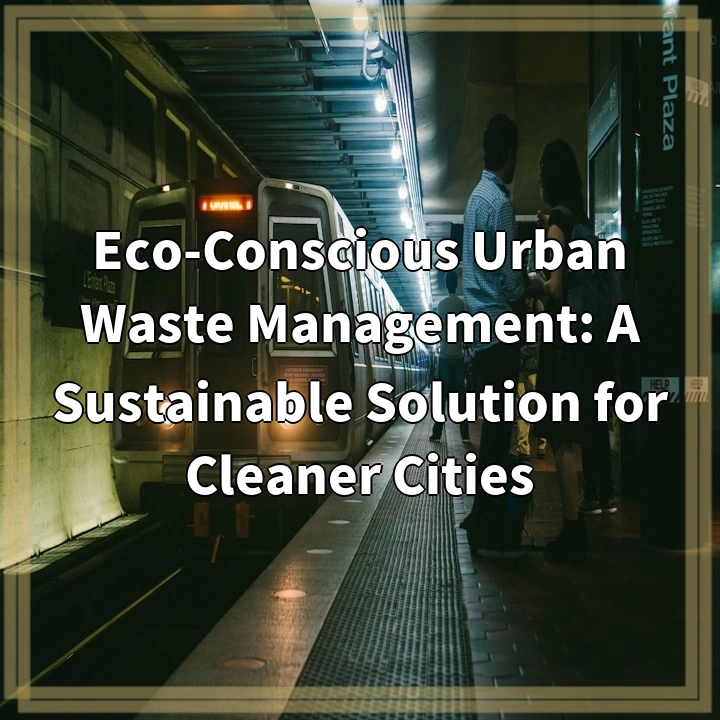
What is Eco-Conscious Urban Waste Management?
Urban areas are often confronted with the challenge of managing growing volumes of waste. Eco-conscious urban waste management refers to a sustainable and responsible approach to handling waste in cities, with a focus on reducing environmental impact, promoting recycling and reuse, and minimizing the need for landfilling or incineration.
Real-World Problems Associated with Eco-Conscious Urban Waste Management
Eco-conscious urban waste management faces various challenges and obstacles in implementation. Understanding these problems is crucial for developing effective strategies to overcome them and achieve cleaner cities.
1. Limited Infrastructure and Resources
Many urban areas lack the necessary infrastructure and resources to support eco-conscious waste management systems. This includes inadequate waste collection and transportation systems, insufficient recycling facilities, and a lack of composting or organic waste processing facilities. Limited financial resources and budget constraints further hinder the development of this infrastructure.
2. Lack of Public Awareness and Participation
Public awareness and participation play a critical role in the success of eco-conscious urban waste management. However, lack of awareness about proper waste sorting, recycling practices, and the importance of reducing waste generation pose significant challenges. Encouraging behavioral change and fostering community engagement is essential to improve waste management practices.
3. Collection and Segregation Issues
Inefficient waste collection and segregation systems are common problems in urban areas. Inadequate waste bins, improper collection schedules, and inadequate segregation of recyclable and non-recyclable waste lead to contamination and hinder efficient waste processing. Ensuring effective collection and segregation practices are essential for the success of eco-conscious waste management.
4. Economic Viability
The economic viability of eco-conscious waste management initiatives is a significant concern. Implementing sustainable waste management practices often incurs high costs, including investment in infrastructure, machinery, and staff training. Finding the right balance between environmental benefits and economic feasibility is crucial for long-term sustainability.
5. Cultural and Behavior Challenges
Cultural practices and behavior patterns pose challenges to eco-conscious urban waste management. In some communities, disposal of waste in open spaces or illegal dumping is deeply ingrained. Overcoming cultural barriers and ingrained habits requires targeted awareness campaigns that effectively communicate the benefits of eco-friendly waste management practices.
Eco-conscious urban waste management offers immense potential for creating cleaner and more sustainable cities. Addressing these real-world problems will require a collaborative effort from governments, communities, and private sectors, along with adequate investment in infrastructure, education, and engagement initiatives.

Solutions to Eco-Conscious Urban Waste Management Challenges
Addressing the real-world problems associated with eco-conscious urban waste management requires implementing effective solutions. Here are key strategies to overcome these challenges:
1. Developing Comprehensive Infrastructure
Investing in comprehensive waste management infrastructure is crucial. This includes establishing efficient waste collection and transportation systems, promoting the development of recycling facilities, and ensuring the availability of composting or organic waste processing facilities. Adequate financial resources should be allocated to build and maintain this infrastructure.
2. Enhancing Public Awareness and Engagement
Increasing public awareness and promoting active community participation are essential for successful waste management. Implementing educational campaigns and awareness programs can help educate citizens about proper waste sorting, recycling techniques, and the importance of waste reduction. Engaging communities through workshops, events, and online platforms can foster a sense of ownership and responsibility.
3. Improving Collection and Segregation Systems
Efficient waste collection and segregation systems are crucial to minimize contamination and improve waste processing. Providing adequate waste bins, establishing regular collection schedules, and promoting the separate collection of recyclable and non-recyclable waste are important steps. Implementing technologies like smart waste bins and improving monitoring systems can also enhance efficiency.
4. Promoting Economic Incentives and Circular Economy
Creating economic incentives can make eco-conscious waste management more financially viable. Offering subsidies or tax benefits to businesses that adopt sustainable waste management practices can encourage participation. Additionally, promoting the concept of the circular economy, where waste is treated as a valuable resource, can drive innovation and create new business opportunities.
5. Cultural Sensitization and Behavior Change
Addressing cultural challenges requires targeted sensitization and behavior change initiatives. Implementing campaigns that highlight the environmental and health benefits of proper waste management can help shift attitudes. Engaging community leaders and influencers can also play a significant role in promoting eco-friendly practices and creating a sense of social responsibility.
By implementing these solutions, cities can overcome the challenges associated with eco-conscious urban waste management and pave the way for cleaner, more sustainable urban environments.















